What scares us now, will be overcome Then.
“There will be 300 high school students in attendance.”
“Half of them will be unbelievers.”
“Oh, and you will be preaching at midnight after the football game,” he concluded.
One of the most important aspects of communication is knowing your audience. I began to think about what teenagers like. I  settled on music and movies. I chose rock lyrics from the most popular bands and the juiciest, youth movie phenomena of the time (1989): Nightmare on Elm Street and its sequels. I subscribed to pop culture magazines and had read an interview with Wes Craven, Nightmare’s creator.
settled on music and movies. I chose rock lyrics from the most popular bands and the juiciest, youth movie phenomena of the time (1989): Nightmare on Elm Street and its sequels. I subscribed to pop culture magazines and had read an interview with Wes Craven, Nightmare’s creator.
“Don’t fall asleep!” was the imperative for those early films. Craven said sleeping was his metaphor targeting apathy. If you “fall asleep” in life, you are unpluggled, emotionally disconnected, brain-dead-indifferent, just waiting to die.
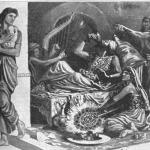 So I chose as my text to preach, Amos 6:1 “Woe to those at ease in Zion.”
So I chose as my text to preach, Amos 6:1 “Woe to those at ease in Zion.”
The students were shocked. Not “shocked” at the movie they knew but that some preacher was using the movie’s message to drive home The Message. 300 teenagers sat on the edge of their seats. They listened to the gospel message that night because the horror genre they knew connected to their eternal need.
The horror genre of film shows our need for salvation.
One of the great horror writers of all time was my first, favorite author in high school. Edgar Allen Poe enlivened my mind with 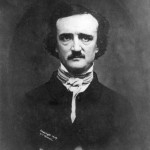 strange tales and riveting poetry. Poe’s most famous poem “Raven” encapsulates the eternal question all ask, “Is there, is there a Balm in Gilead?” I love Poe’s honesty and I identified then and now with his pain.
strange tales and riveting poetry. Poe’s most famous poem “Raven” encapsulates the eternal question all ask, “Is there, is there a Balm in Gilead?” I love Poe’s honesty and I identified then and now with his pain.
Alfred Hitchcock’s psychological horror showed me that so many others felt as I did. I watched his half hour television series each week. I still have his collections of horrific short stories I read in bed with a flashlight. The Birds, one of many movies, was not only scary, but formed Hitchcock’s belief that the apocalypse would entail creation rising up against humanity.
Hitch’s on screen teaching came from a belief that there is another world to which we must give an account.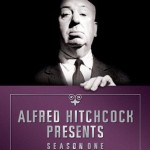
Rod Serling joined my pantheon of prophetic promoters. Serling’s The Twilight Zone gave me a weekly cringing with his fear of nuclear annihilation just around the corner. The stories connected to my basest fears: from the man who broke his glasses sitting in the library after the nuclear holocaust to William Shatner’s unforgettable portrayal of a psychotic who saw what no one else did in “Terror at 20,000 Feet.”
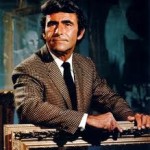 Horror—whether real or imagined—pointed to a need for salvation.
Horror—whether real or imagined—pointed to a need for salvation.
Horror comes in many film forms today. There are the plagues and pestilence movies like Contagion to 28 Weeks Later. Being left to yourself, by yourself is the awfulness of Event Horizon or Cormac McCarthy’s brilliant book brought to theatres The Road. Aliens can provide salvation through beneficence in movies like The Day the Earth Stood Still or E.T. But more often, extraterrestrial creatures bring death, destruction, and judgment through the exceptional Serling offering “Serving Humans” or any of the Alien movies. Judgment leads to apocalypse in The Terminator series or films like Knowing. If humans know annihilation is possible, we know evil is real. Michael Bassett, director of Solomon Kane, uses the  fantasy-horror story line because he takes evil seriously. [1]
fantasy-horror story line because he takes evil seriously. [1]
If evil exists, it must be defeated. Evil and horror show us our need for salvation.
People all over the world write about the struggle with horrific evil. The truth of horror has affected everything and everyone. Books-turned-to-movies like Dracula, Frankenstein, Dr. Jekyl and Mr. Hyde, or The Island of Dr. Moreau tell us evil exists.
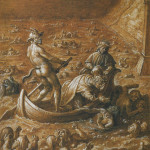 Literary truths from these novels grow out of the truth of Scripture:
Literary truths from these novels grow out of the truth of Scripture:
1. Evil is real, historical, and personal (Gen 3:1-6; 1 Jn 3:8; Rev 12:7-9)
2. Evil will lose in the end (Ps 2; Col 2:13-15; Rev 19:11-21)
3. Evil people follow the principles of “the evil one” (2 Cor 11:13-15; 1 Jn 3:10)
If evil exists, there must be a standard whereby we know to measure evil.
Evil and horror show us our need of salvation.
NEXT WEEK, PART TWO, introducing conservative Christians who work in the horror genre.
Mark cannot watch horror films with demonic voices. The reality is hard to take. This essay will be part of the upcoming book out this September When the Lights Go Down: Movie Review as Christian Practice. This week’s and next week’s essays on horror were the basis for my chapel talk at Moody Bible Institute just prior to the Christian remembrance of Good Friday. Dr. Mark Eckel is Professor of Leadership, Education & Discipleship at Capital Seminary & Graduate School.
[1] Based on Bassett’s interview in the DVD extras.

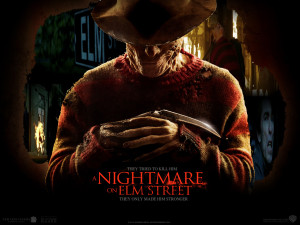
The old black and white lighting certainly casts a suspicious shadow upon old classics like the Outer Limits. The premise of a recent episode was the fear of telling truth yet no one believes you. In the end, truth did prevail.
Now, I’ll have to see William Shatner in a different light. Just picked up a Ravi Zacherias “Deliver us from Evil” and wondered if you had read it.
Oooh! Part Two? I am VERY interested in knowing about Christians who work in the horror genre. I love horror myself, whether it’s a slasher, a spook, or just plain macabre. I’ve written horror stories myself. One of them was a zombie outbreak in a town that was orchestrated by a genius doctor who was bent on ridding the world of human life. He was an atheist, and the message of the story was that Nihilism leads to atrocities. The death of the soul has enormous implications that are first believed and then carried out. To him, he could do what he wanted because he answered to no one. And he felt like the human race needed wiping out, so he came up with a way to do it. He chose a method that some serial killer doctors have used in the past: pretending to be giving vaccinations.
I wrote another horror story that I did not finish. It was about a Catholic Liberal Arts college called Rose Academy for young ladies. Many of the characters weren’t believers at all, and they were forced to come to terms with the fact that a demonic apocalypse was happening on campus. The reality of evil and the existence of demons confronted their unbelief and they were forced to reconsider. The Goodness of God was also a major theme in that story.
I’ve often wondered if writing horror is appropriate for a Christian writer. I’d like to think that it is, because I love horror and I believe in the power of the messages found in horror. I’m VERY interested in that second part, and I think you would agree that Christians can, indeed, write horror.
Regarding your actual article, every movie has a message of some sort, generally speaking at least. Movies are the epic poems of modern-day. Stories have always been used both to entertain and to bring a message, a lesson. Aesop is a perfect example of this. He created short stories with big lessons at the end. It is great to see application of the messages in horror movies to every day life.
Horror movies and other forms of media are excellent gateways for reaching people. Horror movies in particular confront us with issues of good and evil, morality, and so on and so forth. If there truly is no such thing as evil, why does the audience desire for the monster to be put down, the killing sprees to stop? In a Nihilistic reality, such things do not matter. Who cares if Freddy murders kids in their sleep? They’re just meaningless primates anyway. And yet, there is something inherently wrong in the murder of these supposedly meaningless young primates.
You can see morality messages in most horror movies. There’s a reason the cliche of “only the virgin lives” exists. It’s because somewhere sexual immorality is considered worthy of judgment and punishment. This is why people who have sex in movies or participate in other sexual activities such as skinny dipping end up dying. It is not common, as far as I know, for horror movie victims to be innocent human beings who are having a run of bad luck. Certainly some, but definitely not many.
In short: I completely agree. Horror movies are a great vehicle for morality messages and excellent gateways for bringing the Gospel to people. The reality of hell aside, the simple reality of the fallenness and depravity of THIS world, captured in horror movies, confronts us and forces us to cry out to something or someone.
I used “Buffy the Vampire Slayer” as an example of God’s message being shared through all means, even using an atheist writer/creator/producer.
Buffy is the “savior” of the world…the “One” who can defeat evil. At one point she even sacrifices her life in order to “save” the world, and soon comes back to life (though her resurrection was anything but “holy”). Near the end of the series, the power of the “savior” was poured out on all “Potentials,” others who could defeat evil, a close parallel to the outpouring of the Holy Spirit at Pentecost.
As with anything worldly, it isn’t necessarily a perfect analogy, but I think it is quite interesting that this battle of good vs evil is so prevalent in an industry that largely doesn’t believe in such a thing.